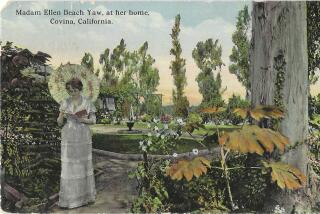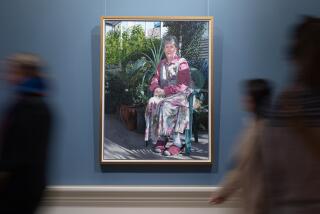ROSE MURPHY’S TINY VOICE AND BIG, JOYFUL SPIRIT
- Share via
In 1948 she was called “The Chee-Chee Girl”--a well-rounded bundle of energy who brought joy and enthusiasm to every piece of music she ever touched.
Nearly 40 years later, singer-pianist and inveterate optimist Rose Murphy is still filled with girlish giggles and the belief that things always work out for the best.
Opening Wednesday night at the Cinegrill in the Hollywood Roosevelt, Murphy is making her first visit to Los Angeles since the mid-’40s. This past weekend, reminiscing about her earlier engagements in the Southland, she recalled an era of star-filled glamour.
“I worked at Jim Otto’s Steak House on La Cienega for five years,” she said, peppering her conversation, like her songs, with fragments of melody and sound, “and I loved every minute of it. I was the intermission pianist and singer--if you want to call what I do singing--for the Nat (King) Cole Trio, and what a thrill that was!
“Anthony Quinn used to come in regularly--always with a beautiful girl. I even played a special number, something I composed on the spot, just for him. He probably won’t remember it, but I still do.”
Despite the then-prevalent segregation policies that prevented black performers from mixing with white audiences, Murphy retains few bitter memories of the era.
“As a matter of fact,” she recalls, “that reminds me of a time when a bunch of armed robbers came into Jim Otto’s. I was just finishing my set, so I played ‘Time on My Hands,’ which was the signal for Nat to come out into the restaurant from backstage, where he had to take his break.”
But when Cole never appeared, she looked in the mirror behind the piano “and saw these gunmen waving their guns around, I got so nervous I played about 10 songs in the next three minutes. Funny thing is that they cleaned the place out, but they never touched the tips on top of the piano. And Nat and his musicians were safer backstage than they would have been if they’d been out mingling with the crowd.”
Ohio-born Murphy, a natural talent who was already playing piano in the third grade (“I used to bang out ‘The Stars and Stripes Forever’ while the other kids came into assembly hall”), became a professional at an early age.
By 1939, she was working at New York’s Famous Door club opposite the Count Basie Band. “It was so funny,” she recalled, “to hear that big, swinging band in that little room. And then, when they’d take their break, I’d come on with my tiny chee-chee voice. Count and the boys used to laugh like crazy--said they’d never heard anything like it.”
Murphy’s real public image was created after she returned East for good. In 1948, she stepped into a Majestic Records studio to record the chirping, chee-chee-ing versions of “I Can’t Give You Anything But Love,” “Cecelia,” “Coquette” and “Honeysuckle Rose,” which were to become pop-music classics.
Like Fats Waller before her, Murphy had the innate wit and good humor to find utterly unique interpretations of what was a fairly standard repertoire. But no one was more surprised by the reaction than she was.
“After the records came out, I was working at Cafe Society,” she explained, “and I got a request to do ‘I Can’t Give You Anything But Love.’ Well, I always do things differently, so I just sang it according to my mood, and the customers said, ‘No, that’s not the way! Do it with chee-chee’s!’ You know, I had to get the record out and listen to it, ‘cause I couldn’t remember what I’d done!”
Like most of the instant-stardom pop-music performers of her generation, Murphy sees few royalties from her recordings, despite their continuing reissuance--both legitimate and pirated--in the United States and Europe. She seems unperturbed by the situation, happy to work when she is called, apparently just as happy to spend time with her many friends when she is not called.
Asked if her apparently unquenchable optimism had a spiritual basis, Murphy giggled one more time. “I don’t suppose I’m any more religious than the average person,” she said. “But I do like to feel at peace with things. I mean, when I look around I see smiling faces all around me, so how can I feel bad?”
More to Read
The biggest entertainment stories
Get our big stories about Hollywood, film, television, music, arts, culture and more right in your inbox as soon as they publish.
You may occasionally receive promotional content from the Los Angeles Times.










